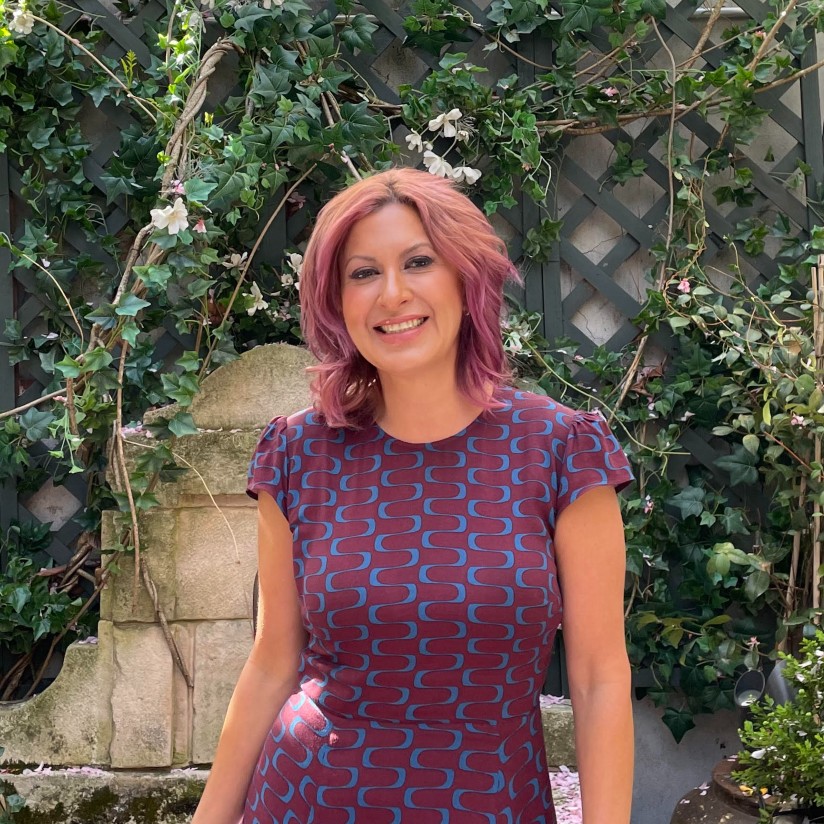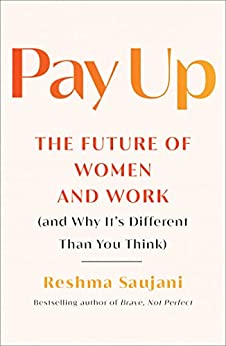'She Pivots': Reshma Saujani, the Founder of Girls Who Code, Wants To Debunk the 'Big Lie of Corporate Feminism'
In the 'She Pivots' podcast, Saujani talks about her career's many twists and turns.


Reshma Saujani is known for many things. There’s her groundbreaking nonprofit Girls Who Code, her three bestselling books, and her new nonprofit, The Marshall Plan For Moms. Plus, she ran for office twice. She’s always pivoting for the sake of women’s rights. But behind the scenes of her dynamic career, Saujani struggled personally with starting the family she so desperately wanted.
Like so many women, Saujani suffered in silence as she tried to get pregnant and carry to term. “There's so much shame and silence around it,” Saujani said. “I thought that was just the price of motherhood, of wanting to be a mom, of wanting to be a boss.”
Her struggles with fertility started when she ran for Congress in 2010, on the heels of President Obama’s historic election. She was 33 and ready to take on the Democratic establishment. Saujani had great credentials: the daughter of refugees, a graduate of Yale Law, and the first Indian-American woman to run for Congress. Still, many discouraged her run for office.
“I was constantly told, ‘It's not your turn. Wait in line. It's not your turn.’ And here I was, this brown girl, who is supposed to represent everything that we were talking about doing in this country, and I was constantly silenced,” said Saujani, “I had all of these women who I admired who were just not happy about it. I remember I went up to Gloria Steinem and she's like, ‘Why are you doing that?”
But Saujani was driven. So when she learned she was pregnant while running for Congress in 2010, she felt it was the culmination of her two dreams: running for office and being a mother.
I bought into this thing that we even had a shot at equality ... [It’s] what I call the big lie of corporate feminism, and I had been selling it
Reshma Saujani
Then she had her first miscarriage—the first of many. And after a grueling race for Public Advocate for New York City 2013, Saujani declined a senior position in the New York City Mayor’s office and quit politics. But instead of abandoning her dreams of making a difference, she shifted her focus to building Girls Who Code. Eventually, the nonprofit became one of the largest pipelines for women in STEM. Since starting in 2012, the organization has taught hundreds of thousands of girls how to code and aimed to close the gender gap in technology.
As Girls Who Code grew, Saujani’s fertility struggles continued. Fueled by what she calls “the big lie,” she conflated success with “doing it all.”
Stay In The Know
Get exclusive access to fashion and beauty trends, hot-off-the-press celebrity news, and more.
“I'd have a miscarriage and then I'd be on stage introducing Obama, smile, smile, smile. I would have another miscarriage, and then I would be there in Utah with 600 girls, smile, smile, smile,” Saujani said. “And so, I don't think that my closest friends, even my team, never really knew my private hell that was happening behind the scenes.”
With her new book, Pay Up, Saujani is challenging the unequal expectations of women and moms, both in the workplace and at home. Like many women, Saujani was crushed by the pandemic and thought if she just worked harder and pushed past her struggles with pregnancy, then she could have it all. Although she no longer runs Girls Who Code, her new movement, the Marshall Plan for Moms, is a direct solution to the inequities women experience at home and at work. Saujani, now a mother of two, lays out a blueprint for how to make “the workplace work for moms” in her book.
“I bought into this thing that we even had a shot at equality,” Saujani shared. “If we just got a mentor, if we just color-coded our calendar, if we just raised our hands more without thinking about what we wanted to say, if we were just braver. [It’s] what I call the big lie of corporate feminism, and I had been selling it. Like, I had been selling it, dishing it out.”
In this episode of “She Pivots,” Saujani discusses how each pivot of her career—and her new outlook on the future of workplace equality—has empowered her to advocate for herself, as well as girls and women across the country.
Emily Tisch Sussman sits down with women weekly on She Pivots to learn about how their personal journeys led to their pivot. Listen to the full conversation on She Pivots, wherever you get your podcasts. Subscribe, leave us a rating and follow us at @ShePivotsThePodcast!

Emily Tisch Sussman is the Founder and Host of “She Pivots,” the podcast in partnership with Marie Claire about women, their stories, and how their pivot became their success. She is a contributing editor to Maire Claire and the guest host of the Marie Claire Instagram Live series “Getting Down to Business.”
-
 What to Know About the Cast of 'Resident Playbook,' Which Is Sure to Be Your Next Medical Drama Obsession
What to Know About the Cast of 'Resident Playbook,' Which Is Sure to Be Your Next Medical Drama ObsessionThe spinoff of the hit K-drama 'Hospital Playlist' features several young actors as first-year OB-GYN residents.
By Quinci LeGardye
-
 Duchess Sophie Stepped Up to Represent King Charles at Event Amid Calls for King Charles to "Slow Down"
Duchess Sophie Stepped Up to Represent King Charles at Event Amid Calls for King Charles to "Slow Down"The Duchess of Edinburgh filled in for The King at the Royal Military Academy Sandhurst.
By Kristin Contino
-
 See the Top-Scoring WNBA Draft Looks
See the Top-Scoring WNBA Draft LooksThis year's rookie class came to win.
By Halie LeSavage
-
 Why I Added Back My Maiden Name—and My Mother’s Maiden Name
Why I Added Back My Maiden Name—and My Mother’s Maiden NameKatie Ann Echevarria Rosen Kitchens, the cofounder and chief curator at FabFitFun, knows her name is a mouthful. But changing her name celebrates her Latinx roots and feminism.
By Katie Ann Echevarria Rosen Kitchens As Told To Tanya Benedicto Klich
-
 Don't Stress! You Can Get in Good Shape Money-wise
Don't Stress! You Can Get in Good Shape Money-wiseFeatures Yes, maybe you eat paleo and have mastered crow pose, but do you practice financial wellness?
By Sallie Krawcheck
-
 Mars Needs Women
Mars Needs WomenThey eat, breathe, and weigh less than men, which, in the context of a months-long space flight, could be a real game-changer. Plus, they bring soft skills that might make the trip a lot more pleasant.
By John Scott Lewinski
-
 New Initiative Pledges 2 Million Mentorship Minutes to Women In Need
New Initiative Pledges 2 Million Mentorship Minutes to Women In NeedDee Poku, founder and CEO of the WIE Suite, wants to get women back into the workforce. And she needs your help.
By Megan DiTrolio
-
 You Can't Pick Produce on Zoom
You Can't Pick Produce on Zoom...but you can organize. Activist and former farm worker Flor Martinez on how she's working for marginalized communities, the forgotten essential workers, during COVID-19.
By Magdalena Puniewska
-
 There Wasn’t a Community for Black Women in Venture Capital. So Black Women in Venture Capital Made Their Own.
There Wasn’t a Community for Black Women in Venture Capital. So Black Women in Venture Capital Made Their Own.In the mid 2010s, Sarah Kunst, Mercedes Bent, Sydney Sykes, and Sydney Thomas were scanning the industry for women who looked like them. Once they found each other, they made it their mission to disrupt the VC game from the inside.
By Megan DiTrolio
-
 Ellevest's Brand-New Membership Model Is Its Most Accessible Yet
Ellevest's Brand-New Membership Model Is Its Most Accessible YetThe female-focused financial planning service just launched a new program designed to help \201cwomen, non-binary people, and male allies" invest.
By Megan DiTrolio
-
 WNBA Players Finally Win a Better Contract
WNBA Players Finally Win a Better ContractAfter 23 seasons of subpar playing conditions, a new collective bargaining agreement finally prioritizes female athletes.
By Megan DiTrolio
